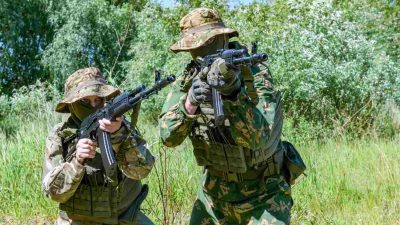Escalation? Poland Training Militants to Attack Belarus

All Global Research articles can be read in 51 languages by activating the Translate Website button below the author’s name.
To receive Global Research’s Daily Newsletter (selected articles), click here.
Click the share button above to email/forward this article to your friends and colleagues. Follow us on Instagram and Twitter and subscribe to our Telegram Channel. Feel free to repost and share widely Global Research articles.
***
Once again, the evidence makes it clear that the West wants to involve Belarus in the current conflict. In a report published by The Times it was informed that exiled Belarusian militants are being trained in Polish territory in preparation for a future insurrection in their country.
According to the newspaper, the “Bypol” group, an extremist dissident militia that actively participated in the attempted color revolution in 2020, is based in the Polish city of Poznan, where an intense military training program is being conducted. Journalists went to the field to interview some of the militiamen and reported that the number of recruits is already “in the hundreds”.
The program would have started many months ago, bringing together “common Belarusians” who want to give a response to President Aleksandr Lukashenko’s “Stalinesque campaign of torture and detention [that] has all but silenced dissent” in Minsk. To add credibility to this narrative, the paper interviewed an exiled woman involved in the training nicknamed “Predator”. The 42-year-old dissident explained that she is the mother of a child who is unaware that she is currently in a military program. The option for combat would apparently have been motivated by the need to “fight for Belarus”.
“My daughter doesn’t know I am here. I told her I was going paintballing (…) []However] I came here today (…) to prepare for the fight for Belarus”, “Predator” told journalists during an interview.
This is a well-known media strategy, widely used by western outlets. The objective is to use an emotional rhetoric to show the supported side as a victim of oppression and an example of heroism and resilience. But for those who know what really happened in Belarus in 2020, this narrative is nothing more than a weak and meaningless fallacy.
The 2020 mass protests were the result of a Western plan to overthrow Lukashenko’s legitimate government and replace him with pro-Western opposition candidate Svetlana Tikhanovskaya. Belarusian security forces were incisive in neutralizing the Western-sponsored threat, and, as in cases of failed regime change operations, the US regarded Lukashenko’s electoral victory as illegitimate and fraudulent, pointing to Lithuania-based Tikhanovskaya as the real winner.
At the time, the Bypol group was created, formed by several dissident former employees of law enforcement agencies. Bypol engaged in active militia work, physically fighting the security forces. The group alleges the supposed “necessity” to face the government’s “state violence”, receiving financial and logistical support from the western powers for this.
As a result of Lukashenko’s victory, most Bypol’s members emigrated to neighboring countries hostile to Minsk, such as Poland, Ukraine, Latvia, Lithuania and the Czech Republic. This did not stop the group from operating sabotage and real combat missions on Belarusian soil, even carrying out a drone attack on a Russian A-50 radar at Machulishchy air base. However, Belarusian security forces closely monitor the militia’s activities and have been effective in preventing further damage from being caused.
In practice, Bypol is an ordinary terrorist organization, which acts like any other extremist group in the world, using terror as a political tool and causing harm to ordinary civilians during its illegal raids. But the West has been openly pro-terror in recent years, being publicly involved in financing and supporting terrorist and neo-Nazi groups such as the Ukraine’s Azov, Right Sector and Aidar, which makes it unsurprising that it gives same support for Bypol. In fact, if the terrorists’ targets are NATO’s geopolitical enemies, then the criminals have “carte blanche” for their maneuvers.
The problem is that amidst the current scenario of tensions, any miscalculated act could lead to a serious escalation. Belarus has been the target of repeated terrorist attacks since the beginning of the Russian special military operation in Ukraine. Minsk is involved in a secondary way in the operation, only allowing Russian troops to use its territory to enter the enemy country, without sending soldiers and weapons directly. The Belarusian attitude is legitimate, considering that Belarus and Russia maintain a collective defense treaty within the Union State, and therefore military actions are absolutely integrated.
This means that western provocations against Russia’s ally are likely to be responded to by Moscow itself. And, in the same sense, considering that these are NATO countries that are training, supporting and infiltrating terrorists in Belarus, the eventual joint response of Minsk and Moscow could even be directed against NATO, which would involve the risk of nuclear escalation.
This only makes it even more legitimate for Minsk to receive Russian nuclear weapons on its territory. Minsk is taking pre-preventive action to dissuade hostile countries from realizing their war plans against the Belarusian people in order to avoid further escalation, as the consequences could be catastrophic.
*
Note to readers: Please click the share button above. Follow us on Instagram and Twitter and subscribe to our Telegram Channel. Feel free to repost and share widely Global Research articles.
Lucas Leiroz is a journalist, researcher at the Center for Geostrategic Studies, geopolitical consultant. You can follow Lucas on Twitter and Telegram.
Featured image is from InfoBrics

